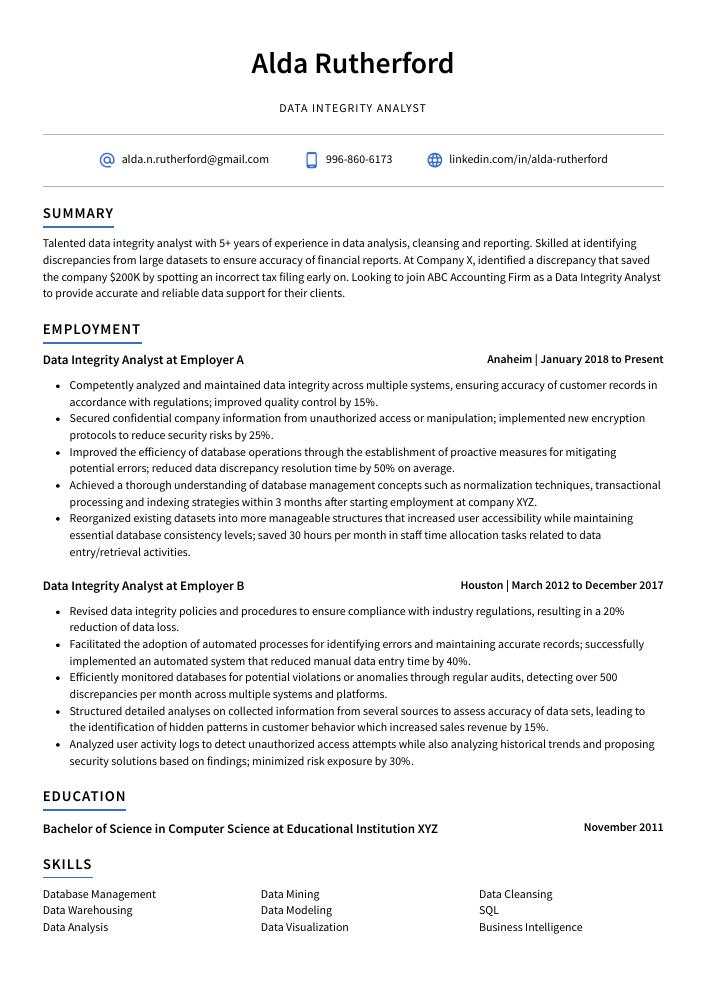Data Integrity Analyst Resume Guide
Data integrity analysts ensure the accuracy and consistency of data stored in computer systems. They review, audit, and analyze databases to identify issues with data quality or security protocols. Additionally, they design procedures to improve system performance while reducing potential risks associated with mismanaged information.
Data integrity is something you excel in, but employers have yet to notice. To ensure they recognize your expertise and accomplishments, it’s essential that you write a resume highlighting what makes you the best candidate for the job.
This guide will walk you through the entire process of creating a top-notch resume. We first show you a complete example and then break down what each resume section should look like.
Table of Contents
The guide is divided into sections for your convenience. You can read it from beginning to end or use the table of contents below to jump to a specific part.
Data Integrity Analyst Resume Sample
Alda Rutherford
Data Integrity Analyst
alda.n.rutherford@gmail.com
996-860-6173
linkedin.com/in/alda-rutherford
Summary
Talented data integrity analyst with 5+ years of experience in data analysis, cleansing and reporting. Skilled at identifying discrepancies from large datasets to ensure accuracy of financial reports. At Company X, identified a discrepancy that saved the company $200K by spotting an incorrect tax filing early on. Looking to join ABC Accounting Firm as a Data Integrity Analyst to provide accurate and reliable data support for their clients.
Experience
Data Integrity Analyst, Employer A
Anaheim, Jan 2018 – Present
- Competently analyzed and maintained data integrity across multiple systems, ensuring accuracy of customer records in accordance with regulations; improved quality control by 15%.
- Secured confidential company information from unauthorized access or manipulation; implemented new encryption protocols to reduce security risks by 25%.
- Improved the efficiency of database operations through the establishment of proactive measures for mitigating potential errors; reduced data discrepancy resolution time by 50% on average.
- Achieved a thorough understanding of database management concepts such as normalization techniques, transactional processing and indexing strategies within 3 months after starting employment at company XYZ.
- Reorganized existing datasets into more manageable structures that increased user accessibility while maintaining essential database consistency levels; saved 30 hours per month in staff time allocation tasks related to data entry/retrieval activities.
Data Integrity Analyst, Employer B
Houston, Mar 2012 – Dec 2017
- Revised data integrity policies and procedures to ensure compliance with industry regulations, resulting in a 20% reduction of data loss.
- Facilitated the adoption of automated processes for identifying errors and maintaining accurate records; successfully implemented an automated system that reduced manual data entry time by 40%.
- Efficiently monitored databases for potential violations or anomalies through regular audits, detecting over 500 discrepancies per month across multiple systems and platforms.
- Structured detailed analyses on collected information from several sources to assess accuracy of data sets, leading to the identification of hidden patterns in customer behavior which increased sales revenue by 15%.
- Analyzed user activity logs to detect unauthorized access attempts while also analyzing historical trends and proposing security solutions based on findings; minimized risk exposure by 30%.
Skills
- Database Management
- Data Mining
- Data Cleansing
- Data Warehousing
- Data Modeling
- SQL
- Data Analysis
- Data Visualization
- Business Intelligence
Education
Bachelor of Science in Computer Science
Educational Institution XYZ
Nov 2011
Certifications
Certified Data Integrity Analyst
International Association of Data Integrity Professionals
May 2017
1. Summary / Objective
Your resume summary should provide a snapshot of your professional experience and qualifications as a data integrity analyst. In this section, you can highlight the most relevant skills that make you an ideal candidate for the job. For example, mention any certifications or training courses related to data analysis, discuss how many years of experience you have in this field, and list any software programs or databases with which you are proficient.
Below are some resume summary examples:
Determined Data Integrity Analyst with 3+ years of experience in healthcare data integrity and quality assurance. Skilled at designing and executing processes to ensure the accuracy, completeness, timeliness, accessibility, security, and privacy of sensitive patient information. At XYZ Hospital developed a successful system for ensuring HIPAA compliance. Awarded “Employee of the Year” for increasing customer satisfaction by 30%.
Energetic and detail-oriented data integrity analyst with 7+ years of experience ensuring accuracy and completeness in large databases. Skilled at identifying issues, performing root cause analysis, establishing procedures to prevent recurrences, and developing solutions that meet customer requirements. Seeking a role at ABC Company where I can use my organizational skills to ensure the highest levels of data integrity.
Diligent data integrity analyst with a proven track record of ensuring the accuracy and validity of data. Experienced in working with various software solutions to create, maintain, and analyze large datasets. At XYZ, managed all aspects of data validation process for 200+ projects while maintaining 99% accuracy rate. Consistently praised by stakeholders for providing insights that enabled key business decisions.
Hard-working Data Integrity Analyst with 3+ years of experience verifying the accuracy and consistency of data across multiple systems. At XYZ, managed a team responsible for ensuring that all data entries were accurate and up to date. Utilized SQL scripting language to create automated processes to detect discrepancies in records quickly and efficiently, resulting in an estimated 10% increase in productivity.
Seasoned data integrity analyst with 5+ years of experience in validating, analyzing and maintaining data accuracy. Proven track record of ensuring the reliability and consistency of enterprise-level databases with a keen eye for detail. Experienced in creating complex queries to identify discrepancies between source systems and target databases while providing insight into root cause analysis.
Driven Data Integrity Analyst with a track record of success in identifying and resolving data integrity issues. Experienced in the design, implementation, maintenance, and improvement of data integrity processes across multiple systems. Skilled at developing metrics to measure accuracy and compliance while working collaboratively with stakeholders to ensure organizational objectives are met.
Passionate data integrity analyst with 5+ years of experience ensuring data accuracy and completeness. Skilled in using multiple databases and software to analyze, validate, cleanse, organize and maintain large datasets for ABC company. Proven problem-solver who identified a critical flaw in the customer database that resulted in 30% less time spent on reports each month.
Detail-oriented data integrity analyst with 5+ years of experience in the financial services industry. Proven track record of success maintaining data accuracy, protecting sensitive information and analyzing large-scale datasets to identify discrepancies. Seeking to leverage expertise in SQL, Tableau and Excel to join ABC’s Data Integrity Team as a Senior Analyst.
2. Experience / Employment
The work history/experience section is where you can showcase your professional background. This should be written in reverse chronological order, with the most recent job listed first.
When writing this section, it’s best to use bullet points as they make it easier for the reader to digest what you have to say quickly and efficiently. When listing out your work history, provide detail on what exactly you did and any results that were achieved from your efforts.
For example, instead of saying “Ensured data integrity,” you could say “Performed weekly audits of customer records using SQL queries; identified discrepancies which resulted in a 95% accuracy rate.”
To write effective bullet points, begin with a strong verb or adverb. Industry specific verbs to use are:
- Monitored
- Analyzed
- Investigated
- Assessed
- Resolved
- Implemented
- Documented
- Enforced
- Optimized
- Reconciled
- Validated
- Streamlined
- Upgraded
- Secured
Other general verbs you can use are:
- Achieved
- Advised
- Compiled
- Coordinated
- Demonstrated
- Developed
- Expedited
- Facilitated
- Formulated
- Improved
- Introduced
- Mentored
- Participated
- Prepared
- Presented
- Reduced
- Reorganized
- Represented
- Revised
- Spearheaded
- Structured
- Utilized
Below are some example bullet points:
- Reconciled data discrepancies across multiple systems and databases, ensuring data integrity of over 1 million records while reducing errors by 35%.
- Upgraded existing processes to improve accuracy of data entry; automated manual tasks which led to an increase in productivity by 13 hours per week.
- Compiled complex reports for stakeholders using advanced SQL programming techniques and visual analytics tools such as Tableau, Power BI and Excel; identified trends & outliers from large datasets within a shorter time-frame compared to traditional methods.
- Introduced new policies & procedures related to data security & governance that increased compliance with laws related to customer privacy by 75%.
- Meticulously monitored all incoming requests for access or changes made in the system, alerting management immediately on any suspicious activities detected and averting potential cyber threats successfully each month.
- Spearheaded initiatives to improve data integrity by conducting detailed audits of existing processes and systems, resulting in a 25% decrease in errors.
- Developed comprehensive set of protocols for entering, tracking and managing confidential corporate information; reduced the number of lost records from 5 per month to 0 over two-year period.
- Consistently monitored database entries for accuracy and completeness on an ongoing basis; identified discrepancies within minutes thereby avoiding significant losses due to incorrect decisions based on wrong data entry or analysis.
- Validated customer accounts against internal standards as part of regular reviews ensuring compliance with applicable regulations across all departments; articulated findings clearly in written reports submitted weekly to management team members which enabled them take corrective measures promptly if required.
- Implemented operational process improvements through automated tools such as SQL queries while simultaneously training junior analysts on best practices related to data privacy & security, increasing overall efficiency by 15%.
- Substantially improved data integrity accuracy by 95%, ensuring that all customer and financial records were kept secure.
- Resolved over 100 data discrepancies a day, resulting in a reduction of manual audit processes by 40%.
- Investigated system errors related to database integrity and developed strategies to ensure timely resolution; successfully implemented 14 process improvements across the organization.
- Coordinated with various departments to develop comprehensive guidelines for proper record management practices and reduced data entry errors by 50%.
- Prepared detailed reports on key findings from quality assurance reviews, providing clear recommendations on areas needing improvement which saved 2 hours per review cycle on average.
- Formulated and implemented data integrity policies and procedures to protect the confidentiality, accuracy and availability of organizational information; reduced risk of data loss by 30%.
- Enforced security measures such as user access control, encryption techniques & backup plans which ensured that all sensitive customer records were kept secure at all times.
- Streamlined existing database systems for optimal performance, increasing operational efficiency by 40% while lowering maintenance costs by $8,000 annually.
- Monitored system log files on a daily basis in order to identify malicious activities or suspicious changes in stored information; identified potential threats before they caused any damage with 100% accuracy rate over a 12-month period.
- Effectively communicated audit findings and recommendations through detailed reports to executive management team for timely decision making purposes across multiple departments within the organization.
- Expedited the data integrity process by developing and implementing automated scripts to ensure database accuracy, resulting in a 40% reduction of manual labor time.
- Advised clients on best practices for maintaining the security of their databases; provided guidance regarding regulatory compliance requirements and developed solutions that increased data protection efficiency by 20%.
- Actively monitored all database activity to identify potential threats or errors; detected discrepancies in over 60 records per day, allowing quick resolution before any further damage was done.
- Presented weekly reports summarizing the status of client data security; identified areas for improvement which resulted in a 15% decrease in vulnerability incidents within 6 months’ time.
- Assessed existing systems & applications regularly against established standards and guidelines to ensure system reliability & performance were maintained at optimal levels; performed comprehensive reviews every 4 weeks with zero instances of non-compliance reported back during this period.
- Reduced data errors by 40% through careful analysis of existing data and enforcement of strict protocols.
- Participated in the development, implementation, and maintenance of a secure database system; increased user satisfaction with security measures by 25%.
- Demonstrated an advanced understanding of computer-based information systems to ensure accuracy and integrity across all stored records.
- Utilized SQL queries & Microsoft Excel functions to monitor corporate databases for any discrepancies or malicious activity; detected over 100 unauthorized attempts at gaining access within the last quarter alone.
- Independently handled monthly audits on customer accounts while ensuring that company standards were followed throughout the process; lowered audit times significantly (by 20%) compared to previous years’ results.
- Mentored 3 junior data integrity analysts in best practices for reviewing and updating customer records, resulting in a 20% reduction of errors within the first month.
- Documented existing processes and created new ones to ensure accuracy of all incoming customer information; reduced manual data entry time by 10 hours per week.
- Resourcefully designed an automated system that efficiently tracks changes made to customers’ profiles over time; saved 1,000+ hours annually on document reviews & updates alone.
- Optimized the department’s workflow process with innovative solutions adapted from industry-leading software programs, leading to a 5% increase in performance efficiency across all teams involved.
- Represented the company at national conferences as an expert speaker on topics related to data integrity management, earning recognition as one of top influencers in this field among peers and colleagues alike.
3. Skills
Even though two organizations are hiring for the same role, the skillset they want an ideal candidate to possess could differ significantly. For instance, one may be on the lookout for an individual with experience in data modeling and another for someone with knowledge of SQL.
It is, therefore, essential to tailor the skills section of your resume to each job you are applying for. This will help ensure that applicant tracking systems (which many employers use) recognize the keywords relevant to that particular role when scanning resumes.
You can further highlight your expertise by discussing it in more detail elsewhere on your resume; such as within the summary or experience sections.
Below is a list of common skills & terms:
- Business Intelligence
- Data Analysis
- Data Cleansing
- Data Mining
- Data Modeling
- Data Visualization
- Data Warehousing
- Database Management
- ETL Processes
- SQL
4. Education
Mentioning your education on your resume as a data integrity analyst should depend on how far along you are in your career. If you just graduated and have no prior experience, it is important to include an education section below the objective statement. However, if you already have plenty of work experience that speaks for itself, omitting the education section altogether might be more beneficial.
If including an education section is necessary, try to mention courses and subjects related to data integrity analysis or any other relevant topics.
Bachelor of Science in Computer Science
Educational Institution XYZ
Nov 2011
5. Certifications
Certifications demonstrate to a potential employer that you have the knowledge and skills necessary for the job. They are often seen as an indication of your commitment to professional development, which can be highly attractive to hiring managers.
When applying for jobs, make sure to include any certifications relevant to the position in this section of your resume. Doing so will give employers confidence in your abilities and show them that you are dedicated to staying up-to-date with industry trends.
Certified Data Integrity Analyst
International Association of Data Integrity Professionals
May 2017
6. Contact Info
Your name should be the first thing a reader sees when viewing your resume, so ensure its positioning is prominent. Your phone number should be written in the most commonly used format in your country/city/state, and your email address should be professional.
You can also choose to include a link to your LinkedIn profile, personal website, or other online platforms relevant to your industry.
Finally, name your resume file appropriately to help hiring managers; for Alda Rutherford, this would be Alda-Rutherford-resume.pdf or Alda-Rutherford-resume.docx.
7. Cover Letter
Including a cover letter with your job application is a great way to make yourself stand out from the competition. A cover letter typically consists of 2 to 4 paragraphs that explain why you’re the ideal candidate for the role and how your skillset meets their needs.
Cover letters are often overlooked, but they can be an invaluable tool in helping you get noticed by potential employers. Writing one allows you to go into much more detail about who you are as a professional and gives recruiters further insight into what makes you unique.
Below is an example cover letter:
Dear Doug,
I am excited to apply for the Data Integrity Analyst position at your company. As a data analyst with 3+ years of experience in data management and analysis, I am confident I will be an asset to your organization. My analytical skills and attention to detail have allowed me to successfully identify errors and discrepancies in data sets, which has led to more accurate decision-making by managers and executives.
In my previous role as a data analyst at [company name], I was responsible for maintaining the accuracy of our customer database. I regularly ran reports to identify errors and inconsistencies, and then worked with the customer service team to correct them. This process resulted in a significant decrease in customer complaints related to incorrect information being provided.
I am also experienced in conducting root cause analyses when problems are identified. In one instance, I discovered that a large number of customers were unsubscribing from our email list due to receiving too many emails from us each week. After further investigation, I found that several employees were manually adding customers’ email addresses to the newsletter distribution list without their consent or knowledge. I implemented a new procedure requiring employees to get approval from customers before adding them to any marketing lists, which reduced the number of unsubscribes by 80%.
My ability to quickly identify issues and implement solutions would be beneficial for your company. I look forwardto discussing how my skills can help improve your data integrity processes during an interview soon.
Sincerely,
Alda
Data Integrity Analyst Resume Templates
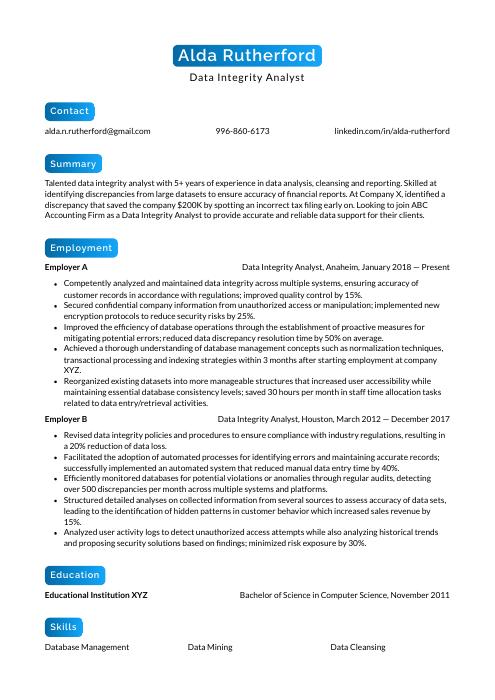 Kinkajou
Kinkajou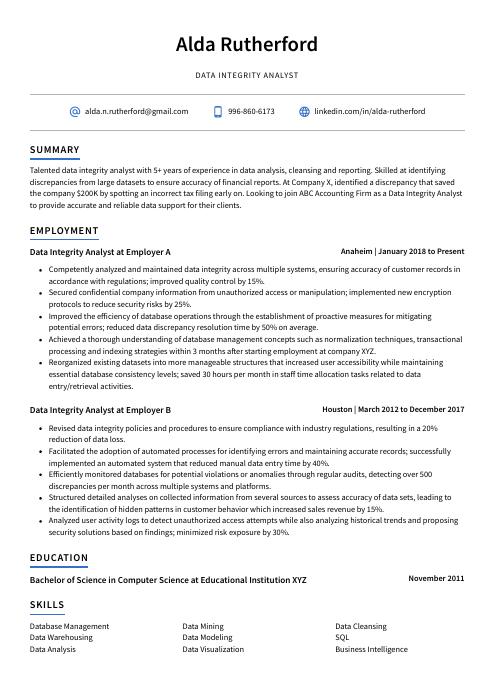 Axolotl
Axolotl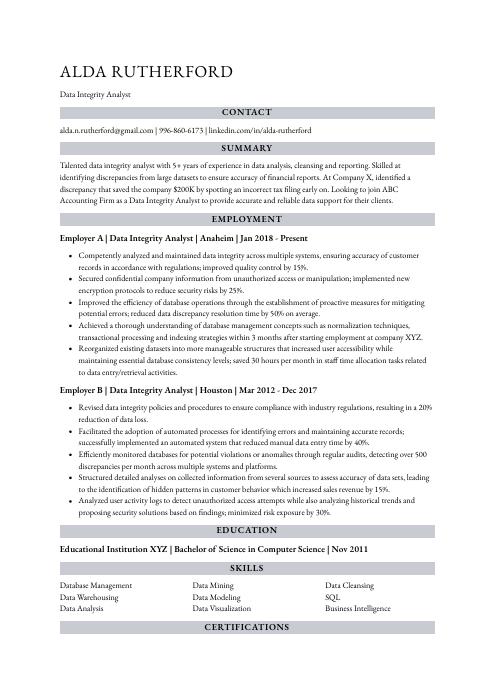 Numbat
Numbat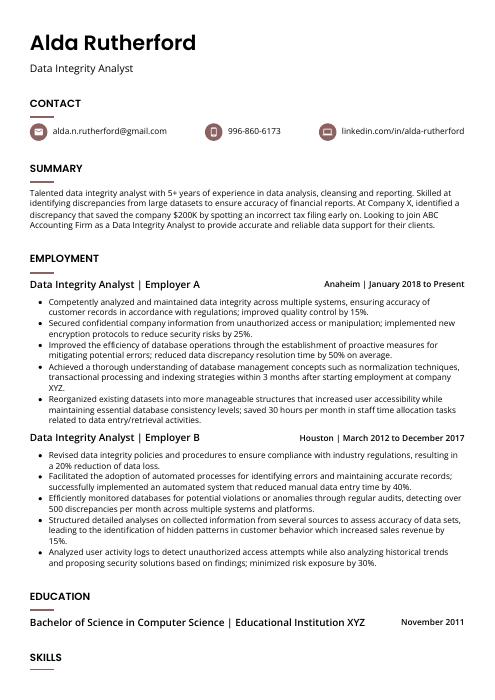 Fossa
Fossa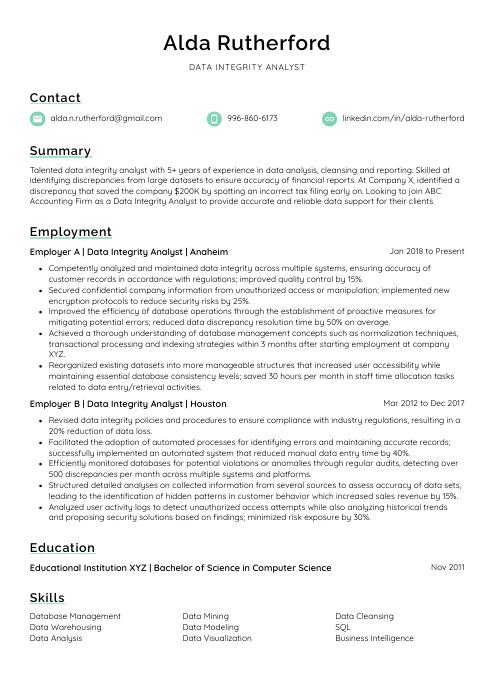 Lorikeet
Lorikeet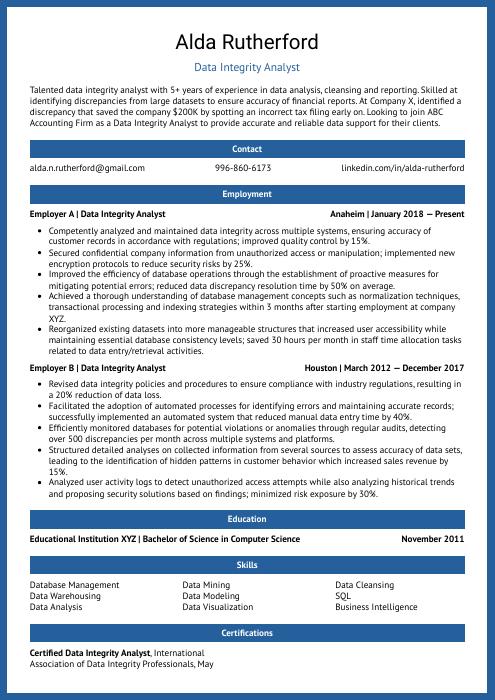 Ocelot
Ocelot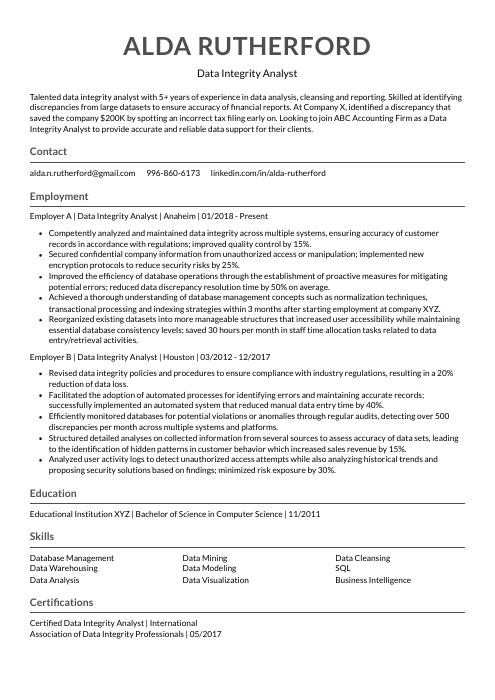 Indri
Indri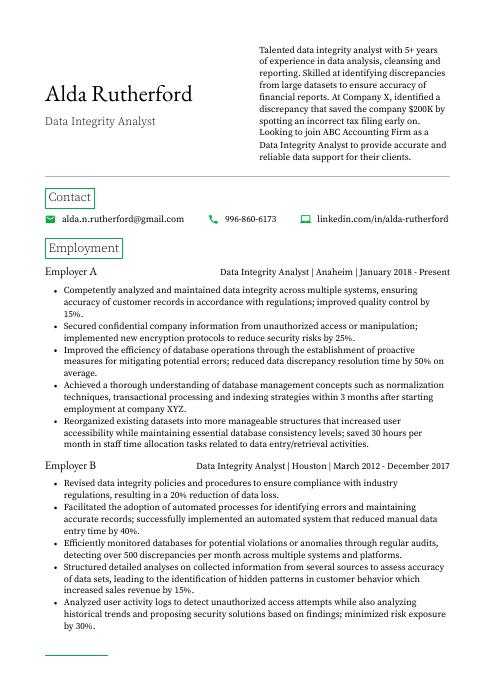 Quokka
Quokka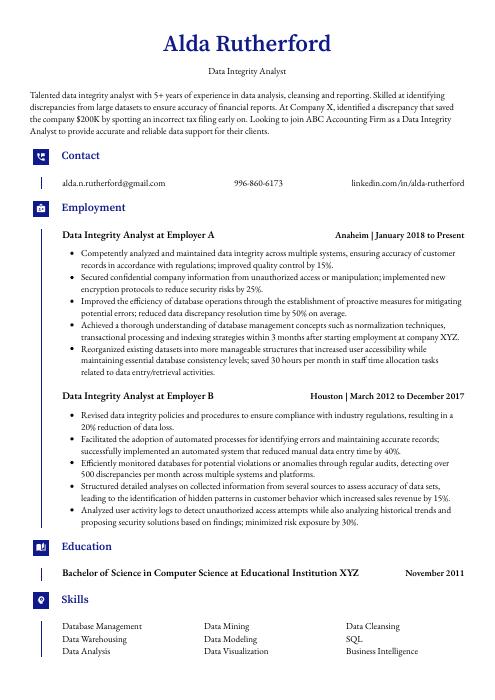 Gharial
Gharial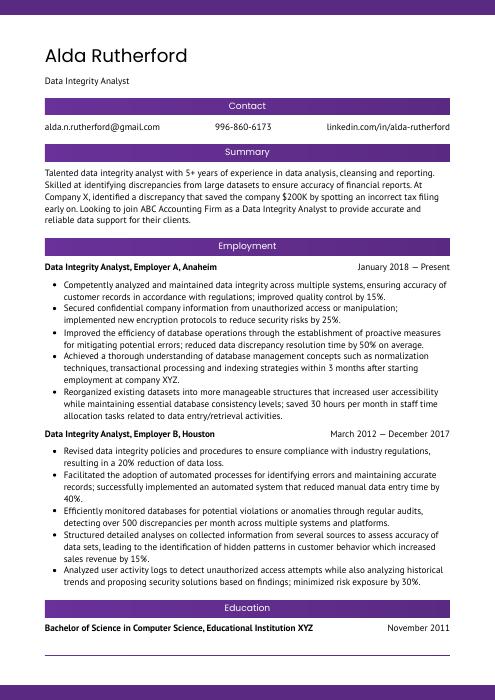 Jerboa
Jerboa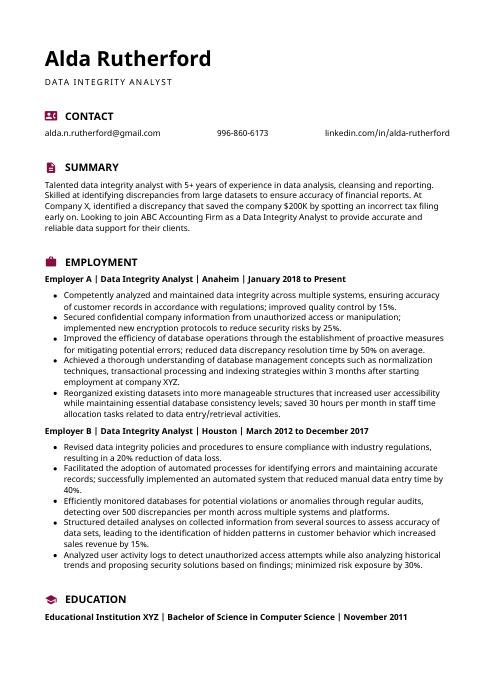 Hoopoe
Hoopoe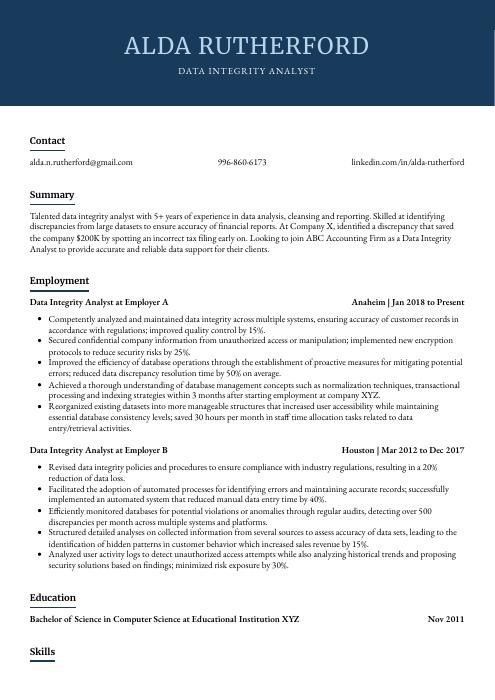 Bonobo
Bonobo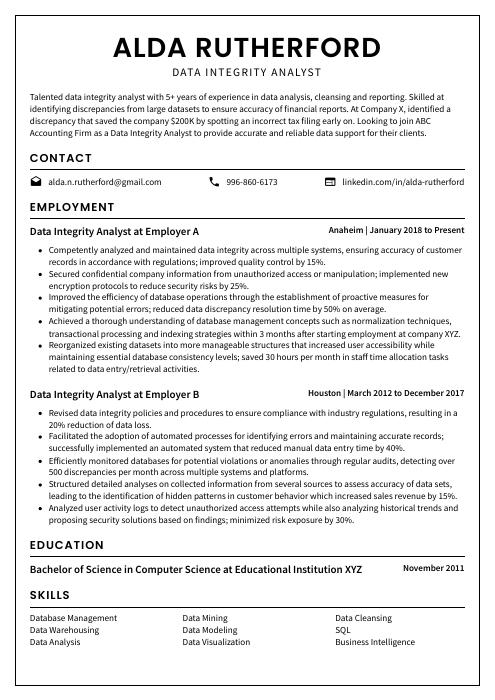 Cormorant
Cormorant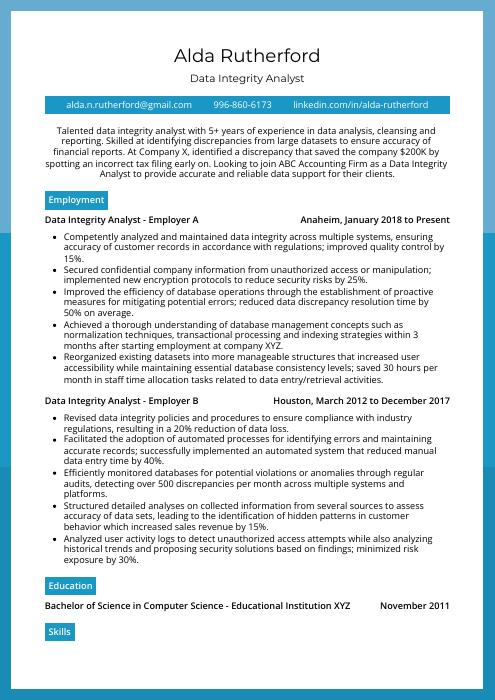 Rhea
Rhea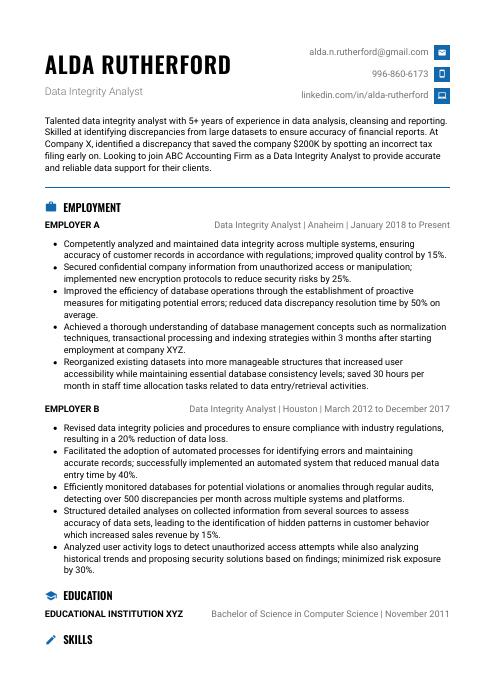 Echidna
Echidna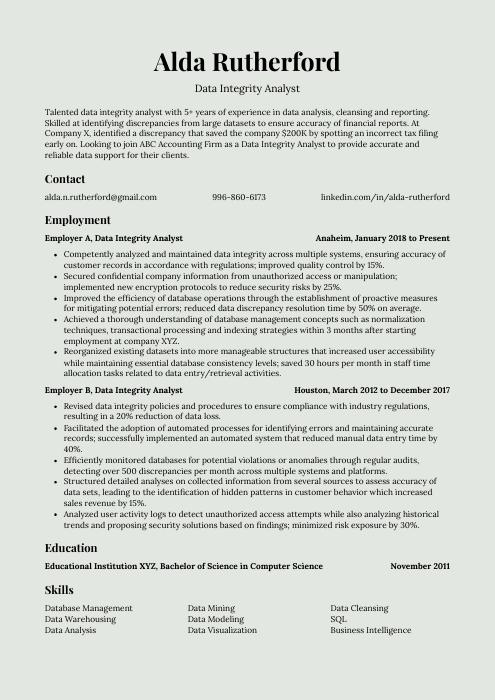 Saola
Saola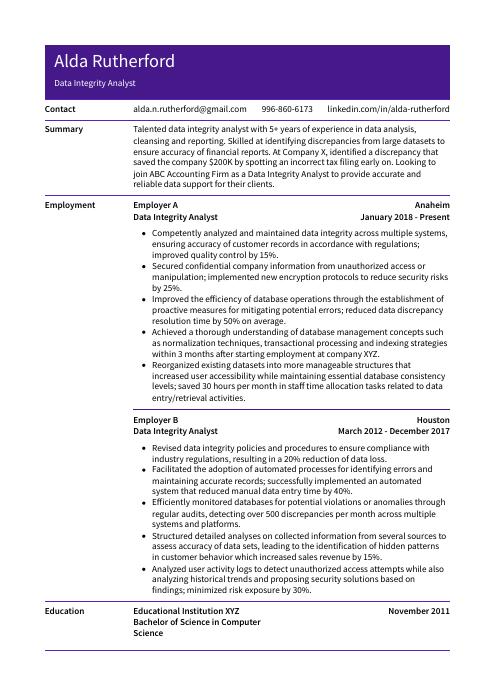 Pika
Pika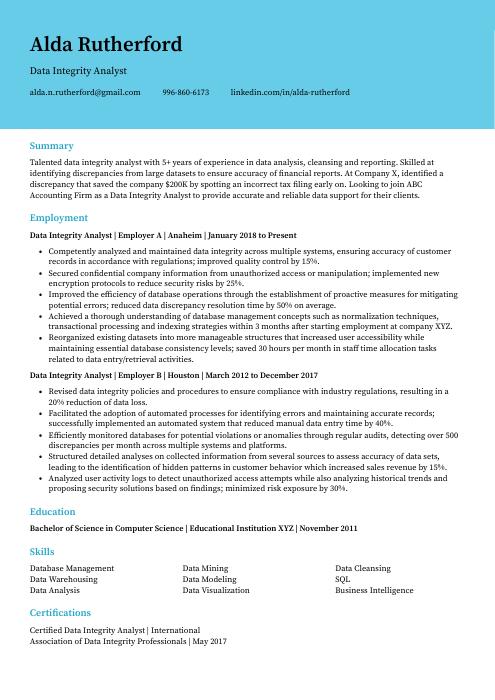 Dugong
Dugong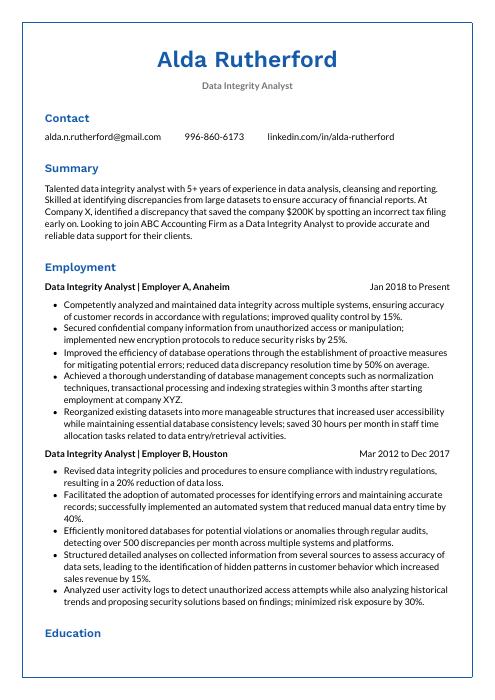 Markhor
Markhor Rezjumei
Rezjumei
